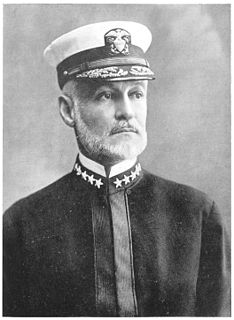Clinton is an English toponymic surname, indicating one's ancestors came from English places called Glympton or Glinton. Clinton has frequently been used as a given name since the late 19th century. Baron Clinton is a title of peerage in England, originally created in 1298.
Cochrane is a surname with multiple independent origins, two Scottish and one Irish. One of the Scottish names derives from a place in Scotland; the Irish surname and the other Scottish surname are both anglicisations of surnames from the Irish language and Scottish Gaelic respectively.

William Sowden Sims was an admiral in the United States Navy who fought during the late 19th and early 20th centuries to modernize the navy. During World War I he commanded all United States naval forces operating in Europe. He also served twice as president of the Naval War College.
William Brown may refer to:
Myers is a(n) Dutch, English, and German origin surname. The English origin of the surname has multiple possible sources: Anglo-Saxon England, from the Old English word maire meaning "mayor", the Old French mire meaning "physician", or the Old Norse myrr, meaning "marsh". The German origin of the surname Myers has the meaning "steward or bailiff," as in the magistrate of a city or town.
Murray is both a Scottish and an Irish surname with two distinct respective etymologies. The Scottish version is a common variation of the word Moray, an anglicisation of the Medieval Gaelic word Muireb ; the b here was pronounced as v, hence the Latinization to Moravia. These names denote the district on the south shore of the Moray Firth, in Scotland. Murray is a direct transliteration of how Scottish people pronounce the word Moray. The Murray spelling is not used for the geographical area, which is Moray, but it became the commonest form of the surname, especially among Scottish emigrants, to the extent that the surname Murray is now much more common than the original surname Moray. See also Clan Murray.
William Taylor may refer to:
Edward or Ted Hughes may refer to:
Key is a surname, and may refer to:
McNulty is an ancient Gaelic-Irish surname, meaning "son of the Ulsterman". Usually considered a branch of the Ulaid ruling dynasty of Mac Duinnshléibhe (MacDonlevy) who fled Ulaid to Ailech after the former's conquest in 1177 by the Normans, DNA analysis points to descent from other Ulaid families as well. After the Battle of Kinsale in 1602, some McDonlevys and McNultys migrated to the province of Connacht where their name is now common.
Kennedy, alternately O'Kennedy and Kennedie, is a surname of Irish and Scottish origin that has also been used as a given name.
William Hobby may refer to:
Hispanics in the United States Navy can trace their tradition of naval military service to men such as Lieutenant Jordi Farragut Mesquida, who served in the American Revolution. Hispanics, such as Seaman Philip Bazaar and Seaman John Ortega, have distinguished themselves in combat and have been awarded the Medal of Honor, the highest military decoration of the United States. Hispanics have also reached the top ranks of the navy, serving their country in sensitive leadership positions on domestic and foreign shores. Among those who have reached the highest ranks in the navy are Commodore Uriah Phillips Levy, of Sephardic and Ashkenazic Jewish descent, who participated in the War of 1812 as an assistant Sailing master; Admiral David Glasgow Farragut, for whom the rank of admiral in the U.S. Navy was created during the American Civil War; and Admiral Horacio Rivero, who led the navy during the Cuban Missile Crisis.
Lavery, also spelled Lowry, Lowrie, Lory, and Lowery, is an Irish surname derived from the Gaelic Ó Labhradha, meaning the "descendants of Labhradha".
Chandler, and its variant spellings, is a family name that originated as an occupational surname in medieval England. It applied to a person involved in making or selling candles and similar articles. The earliest records as a surname are of Matthew le Candeler in London in 1274 and William le Chandeler in Essex in 1275. In the 1881 census of England, the surname Chandler was apparently used by over 0.3% of the population.
Crawford is a surname and a given name commonly associated with Scotland.
Montgomery is a surname derived from Saint-Germain-de-Montgommery in Normandy, France. Although there are many stories of its origin, an old theory explains that the name is a corruption of "Gomer's Mount" or "Gomer's Hill", any of a number of hills in Europe named in attribution to the biblical patriarch Gomer, but it does not explain the final -y or -ie and it does not correspond to the old mentions of the place name Montgommery in Normandie : Monte Gomeri in 1032–1035, de Monte Gomerico in 1040 and de Monte Gumbri in 1046–1048. More relevant is the explanation by the Germanic first name Gumarik, a compound of guma "man" and rik "powerful", that regularly gives the final -ry (-ri) in the French first names and surnames. Moreover, the name is still used as a surname in France as Gommery, from the older first name Gomeri.
William M. Hobby (1899–1942), was a United States Navy officer killed in action during World War II for whom a U.S. Navy ship was named.
Halsey is an English surname with several possible origins. It may be derived from Alsa, in Stansted Mountfitchet, Essex, England. This place name was once known as Assey, and was recorded as Alsiesheye in 1268. Another possibility is that the name is derived from Halsway, in Somerset, England. The latter place name is derived from the Old English word elements hals ("neck") and weg.
